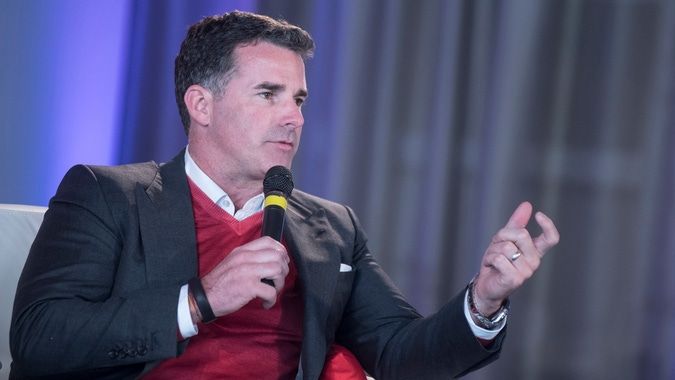In 1995, Kevin Plank founded Under Armour after dreaming of a non-sweaty t-shirt after working out on his football team. The inspiration is classic startup fodder… but one year in, it wasn’t going so hot.
Plank was $43,000 in personal debt after spending his life savings and $40,000 of credit card debt to get the company off the ground. In its first year, Under Armour only made a pithy $17k in sales. Fast forward fifteen years to 2010, and Under Armour saw its first billion-dollar sales year. At one point, the company had 26 consecutive quarters of 20% year-over-year revenue growth or more.
Under Armour’s CEO Was “Broke” After Year One. Here’s What Happened Next That Led To A Billion-Dollar Brand - Post Outline
Since then, Plank and Under Armour have seen ample growth – but also ample controversy. There was the bear-hunting influencer scandal.
There was the federal accounting probe. Going on CNBC in 2017 to declare himself a Trump supporter didn’t help, drawing the ire of sponsored athletes like NBA star Steph Curry and ballerina Misty Copeland. When he later quit Trump’s Manufacturing Council, it was Republicans’ turn to boycott the brand as well.
We could go on and on about the thrilling victories and agonizing setbacks that come with running an empire. But if you think about it, the roller coaster ride almost never happened. What changed after that first year to take Under Armour from money pit to billion-dollar brand? Here are three important takeaways.
Take Complete Control
To new entrepreneurs, Plank gives two pieces of advice: Don't blame forces outside of your control, and tough it out in the early days rather than taking on investments or giving away equity.
At one point in 1997, when he was desperate to make his first sale and pay his manufacturers the money he couldn’t afford, he took what little he had and went gambling in Atlantic City. He lost every penny and thought his company was ruined.
But the next day, when he checked the PO box he held for Under Armour, he discovered he had actually already made his first sale - Georgia Tech had purchased $7,500 worth of merchandise, enough to pay his manufacturing bill. Plank realized that he could blame many circumstances for his failure and try to numb out in response, but that his business wouldn’t grow if he continued doing that.
“You need to put your hands around the throat of your business, and you need to run it. There’s no other way,” he said in a talk given to students at the University of Maryland about what it takes to become a successful entrepreneur.
Lean Into Your Network
Many entrepreneurs are proud to claim they made it all by themselves. In contrast, Plank happily admits that Under Armour relied on his existing network to succeed, pointing to his family, friends, and early employees.
Rather than spending time and money to get himself an office, the CEO sold his first shirts out of his car and his grandma’s basement. He had extremely low expenses because he was relying on his family to house him and feed him.
Many of Under Armour’s first sales came directly from Plank’s former football teammates. When some of these players later went pro, Plank used a Trojan horse strategy and gave his peers samples for their teammates to try, helping to spread the word.
Related: 5 Small Business Strategies to Recover, Rebuild and Be Ready
Don’t Be Afraid To Go Corporate
Under Armour’s earliest customers weren’t casual joggers; they were big football teams that wanted to equip their entire teams in Under Armour sportswear. As Plank’s old teammates helped him spread the word about the brand, the founder discovered it was much easier to focus on beefier team sales and corporate partnerships.
The first set of big sales that got him firmly out of the red was selling $100,000 worth of shirts to a dozen college teams for uniforms in 1997. Plank understood his market audience could be individual consumers and corporate, but those early sales were critical for building a recurring revenue machine. By focusing on bulk purchases, he was able to save time and accumulate capital along the way.
Related: Is There an Ideal Price Point for Your Product?
Final Takeaways
One year in, Plank’s company looked to be on its deathbed. Instead, the company built up an empire valued at $4.48 billion in 2020 by blazing its own trail.
- Maintain an internal locus of control – Focus on what you can control and don’t accept outside circumstances as the reason for your fate.
- Use what you have – Your network and connections, be they family, friends, or colleagues, can help you grow your business.
- Go after big fish – If you’re just starting out, you can save time by aiming for larger sales, then diversify later on down the road.
Beginning a business is tough. Most founders don’t see immediate success. Under Armour’s story proves that even if you fail at the start, you can come back swinging.
*
This post was originally written for Entrepreneur.com. Copyright 2021 by Entrepreneur Media, Inc. All rights reserved.
Thanks for reading. 🙏🏼
Keep up the momentum with one or more of these next steps:
📣 Share this post with your network or a friend. Sharing helps spread the word, and posts are formatted to be both easy to read and easy to curate – you'll look savvy and informed.
📲 Hang out with me on another platform. I'm active on Medium, Instagram, and LinkedIn – if you're on any of those, say hello.
📬 Sign up for my free email list. This is where my best, most exclusive and most valuable content gets published. Use any of the signup boxes in this article, or go to the newsletter page here.
🏕 Up your marketing game: Camp Wordsmith™ is my business and writing program for small business owners and online entrepreneurs. Get instant access to resources and templates guaranteed to make your marketing hustle faster, better, easier, and more fun. (It's also "glamping"-themed – who doesn't love luxurious camping?!) Learn more here.
📊 Hire my marketing company: Hefty Media Group provides consultation and done-for-you services in content marketing. We're a certified diversity supplier with the National Gay & Lesbian Chamber of Commerce, and we'll make you sound damn good via the written word. Learn more here.
© 2021, 2022, Hefty Media Group. All Rights Reserved.


